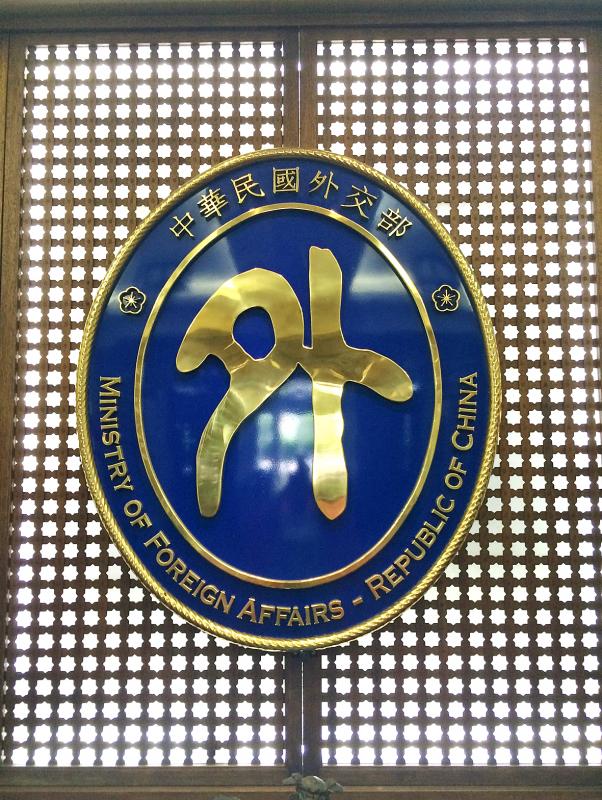Taiwan would strive to join the Comprehensive and Progressive Agreement for Trans-Pacific Partnership (CPTPP), as it would be challenging for the nation to join the Regional Comprehensive Economic Partnership (RCEP) given China’s dominance in the latter, the Ministry of Foreign Affairs said yesterday.
The RCEP was signed by 15 Asia-Pacific nations on the last day of the virtual ASEAN summit yesterday, becoming the world’s largest free-trade agreement.
The 15 nations are the 10 ASEAN members — Brunei, Cambodia, Indonesia, Laos, Malaysia, Myanmar, the Philippines, Singapore, Thailand and Vietnam — and Australia, China, Japan, New Zealand and South Korea.

Photo: Lu Yi-hsuen, Taipei Times
Taiwan would find it substantially difficult to join the RCEP, as it is led by China, the ministry said, adding that, as such, Taiwan’s main goal regarding regional economic integration is to push for participation in the CPTPP.
Taiwan would strive to initiate informal consultations, in preparation for joining the CPTPP, the ministry said, adding that it would continue to seek economic and trade cooperation opportunities with New Southbound Policy partner nations, the US, Japan and other like-minded nations.
Taiwan would make good use of the “US-Taiwan Framework to Strengthen Infrastructure Finance and Market Building Cooperation,” the ministry said, adding that the government would also support adding value to products and industrial transformation.
Separately yesterday, the Chinese Nationalist Party (KMT) accused the Democratic Progressive Party (DPP) government of not proactively trying to join the RCEP over the past four years, and declaring failure without even trying.
The trade volume between Taiwan and RCEP members accounts for about 59 percent of the nation’s total trade volume, and Taiwan’s investment in those nations accounts for 65 percent of its total foreign investment, so if Taipei cannot join the trade pact, the nation would suffer, the KMT said.
The DPP, trying only to please the US in the hopes of furthering economic and trade cooperation with Washington, neglected the development of the RCEP and the CPTPP, the KMT said, adding that the DPP’s failure in this regard could result in Taiwan being marginalized economically.
The party urged President Tsai Ing-wen (蔡英文) to call a high-level, cross-ministerial meeting to discuss how the RCEP would affect Taiwan and draw up solutions, saying that a report should be presented to the Legislative Yuan so that the public is not kept in the dark.

The Central Election Commission has amended election and recall regulations to require elected office candidates to provide proof that they have no Chinese citizenship, a Cabinet report said. The commission on Oct. 29 last year revised the Measures for the Permission of Family-based Residence, Long-term Residence and Settlement of People from the Mainland Area in the Taiwan Area (大陸地區人民在台灣地區依親居留長期居留或定居許可辦法), the Executive Yuan said in a report it submitted to the legislature for review. The revision requires Chinese citizens applying for permanent residency to submit notarial documents showing that they have lost their Chinese household record and have renounced — or have never

A magnitude 5.6 earthquake struck off the coast of Yilan County at 12:37pm today, with clear shaking felt across much of northern Taiwan. There were no immediate reports of damage. The epicenter of the quake was 16.9km east-southeast of Yilan County Hall offshore at a depth of 66.8km, Central Weather Administration (CWA) data showed. The maximum intensity registered at a 4 in Yilan County’s Nanao Township (南澳) on Taiwan’s seven-tier scale. Other parts of Yilan, as well as certain areas of Hualien County, Taipei, New Taipei City, Taoyuan, Hsinchu County, Taichung and Miaoli County, recorded intensities of 3. Residents of Yilan County and Taipei received

Taiwan has secured another breakthrough in fruit exports, with jujubes, dragon fruit and lychees approved for shipment to the EU, the Ministry of Agriculture said yesterday. The Animal and Plant Health Inspection Agency on Thursday received formal notification of the approval from the EU, the ministry said, adding that the decision was expected to expand Taiwanese fruit producers’ access to high-end European markets. Taiwan exported 126 tonnes of lychees last year, valued at US$1.48 million, with Japan accounting for 102 tonnes. Other export destinations included New Zealand, Hong Kong, the US and Australia, ministry data showed. Jujube exports totaled 103 tonnes, valued at

BIG SPENDERS: Foreign investors bought the most Taiwan equities since 2005, signaling confidence that an AI boom would continue to benefit chipmakers Taiwan Semiconductor Manufacturing Co’s (TSMC, 台積電) market capitalization swelled to US$2 trillion for the first time following a 4.25 percent rally in its American depositary receipts (ADR) overnight, putting the world’s biggest contract chipmaker sixth on the list of the world’s biggest companies by market capitalization, just behind Amazon.com Inc. The site CompaniesMarketcap.com ranked TSMC ahead of Saudi Aramco and Meta Platforms Inc. The Taiwanese company’s ADRs on Tuesday surged to US$385.75 on the New York Stock Exchange, as strong demand for artificial intelligence (AI) applications led to chip supply constraints and boost revenue growth to record-breaking levels. Each TSMC ADR represents